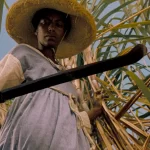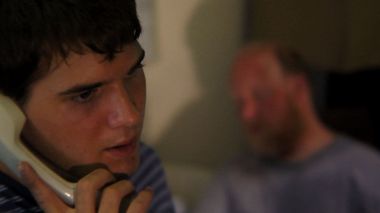On The Outside Looking In, by David Bax
The world is an awful place. I don’t mean to sound like a pessimist; the world is also a breathtakingly beautiful place filled with people who are capable of great kindness, compassion and the means to move us forward as a race and a planet. But the world is also peopled by thoughtless, monstrous beings, eager to casually destroy lives, to prey on and debase the essence of humanity. There are horrible, atrocious things going on all over the world – all over the very city where you live – at this very moment. Most of us endure by spending the majority of our time simply not thinking about these truths. For those who can’t do so – either for situational or mental reasons – there are few options (one extreme and inadvisable choice is detailed in Bobcat Goldthwait’s God Bless America). The best of us can only hope we would be able to face life’s ugliness with a mix of sobriety, humility and the right amount of laughter. Polisse, a new film from director Maïwenn, is about a group of people who attempt to do just that.
Polisse has no single, driving plot thread. The film covers roughly a year in the lives of officers attached to Paris’s Child Protective Unit. This unit addresses, as its name would suggest, crimes in which the victims are children. Essentially, this covers abuse (both sexual and nonsexual) and neglect. With the most episodic of structures, we see multiple cases unfold and get resolved (or not resolved) as well as brief looks into the characters’ personal lives, as portrayed by, among others, Karin Viard (from last year’s underrated My Piece of the Pie), Marina Foïs, Joey Starr and Maïwenn herself.
As you might expect, there is some truly shocking stuff on display here. Even more surprising is how frank and unadorned Maïwenn’s approach to the material is. The officers are too seasoned to gasp or wring their hands but they are still more than capable of anger in the face of a father who has raped his daughter or a woman seen violently shaking her infant child.
What you might not expect – what might truly shock you, in fact – is how funny Polisse is. In many ways, it’s humorous in the same way that any well-made, naturalistic slice of life would be. It’s funny because life is funny and we laugh because we recognize and empathize. At other times, though, the comedy provides insight into the thick skin one would have to grow to survive this line of work. The gallows humor is sometimes jaw-dropping in that it is what we would call callous if we weren’t watching such an insightful film. In one memorable instance, the cops are unable to stop themselves from laughing at the ridiculousness of a teenage girl agreeing to give a boy a blowjob so that he’ll return the cellular phone he’s stolen from her. “You must really love that phone,” an officer says. “It’s a smartphone,” the girl replies. And a new wave of giggles is unleashed.
These scenes of daily life on the job take up the lion’s share of the running time and rightfully so because they are the film’s strength. When we go home with the characters, we enter more troublesome territory. Perhaps it’s indicative of these people’s inability to relate to the normal world but many of these scenes feel false and overwrought. When one cop’s wife complains that he is so closed off, he asks her if she really wants to hear about the things he says at work and then proceeds to detail some of them to make his point. That scenario was corny when it was in Heat back in 1995.
I think the real reason those scenes don’t work, though, is that Maïwenn (along with her co-screenwriter Emmanuelle Bercot) are trying too hard within them to understand their characters. When they are at work, the director shows us events as her character sees them. Maïwenn plays a photojournalist assigned to embed herself with the unit and document what they do. As the outsider, she is constantly studying without every quite comprehending.
Perhaps that’s the point. As engaging and enveloping as Polisse is, we could never hope to actually feel what these men and women do unless we lived their lives. At the end of the two hour movie, we get to go home and, if we so choose, never revisit or think about it. At the end a year for them –despite the undeniable good they have done and the dire toll their experiences have taken – the world will continue its awful ways.






























